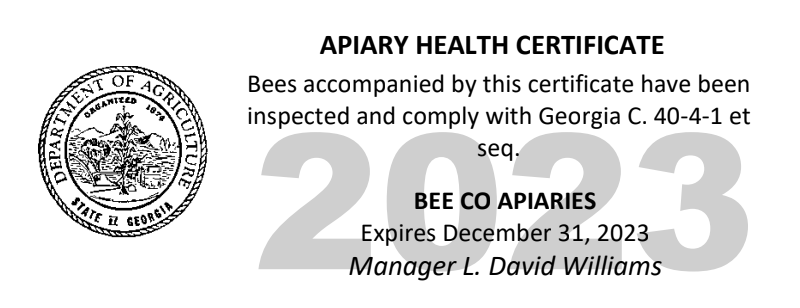6 Tips for Buying Bees this Spring
Considering purchasing bees? Below are 6 tips to keep in mind whether you are an experienced beekeeper or just getting started.
1. Buy from a reputable beekeeper. There are many people selling bees. Our number one suggestion is to find a reputable beekeeper. What makes a beekeeper reputable? First of all, if they are selling bees on a commercial scale, their apiary should be certified by a state inspector. This certification helps ensure that their bees are being managed and treated appropriately for common diseases and especially varroa. You can also purchase bees from a reputable local beekeeper. Talk to your local beekeeping club or county extension agent for suggestions. Beekeeping is an investment, so you want to make sure you are purchasing bees from a healthy apiary and a beekeeper who understands and implements healthy beekeeping practices.
2. Decide what type of bees you want to buy. There are three common ways to purchase bees. You can purchase bees as packages, nucs (nucleus hives), or established colonies.
Package - Packages are plastic or wood boxes with 3 lbs. of bees and a new, mated queen.
Pros: This is usually the cheapest way to purchase bees. You need one package per hive you are wanting to start. We recommend packages for beekeepers with some previous experience.
Cons: You only get the bees and queen. There are no frames or resources like pollen, brood, honey, or comb for the bees to start with. They will need to build out the comb before anything else can happen. Queens tend to abscond. This makes packages a risky choice for new beekeepers.
Nucleus Hive - Nucs are 4-5 frames with brood, bees, and an actively laying queen.
Pros: You get an actively laying queen, bees that are at various ages and know how to work together. Unlike packages, nucs can get to work right away since they have resources and frames established.
Cons: More expensive than a package.
Established Colony - Hive with an actively laying queen, frames, and equipment included.
Pros: Get everything you need in one stop. Many beekeepers sell established colonies at discounted rates if they are looking to replace older equipment that is still usable.
Cons: Can be a difficult place to start for a new beekeeper who is not yet used to doing hive inspections. This is a larger hive than a nuc or package and thus more bees to manage.
3. Order your bees early. Once you’ve identified a supplier, contact them to place your order. Many operations start accepting pre-orders as early as the previous fall season. Most suppliers are in the southern states. They have a limited supply of bees and only so much time to prepare them for buyers before it gets too warm.
4. Prepare your equipment, supplies, and location before you pick up your bees. You will need to paint the exterior of the boxes. You should have everything set up and ready to go when you pick up your bees. That way, when you arrive home all you need to do is install your bees.
→ Honey and Beekeeping Supplies in Sparta, GA
5. Feed your bees. You will want to feed your newly installed bees when you first bring them into your apiary. How long you feed them will depend on what type of bees you purchased as well as the local climate and weather.
6. Join a local beekeeping club. Whether this is your twentieth or first hive, we can always learn something new or use a helping hand. That’s where beekeeping clubs come in! Join a local, regional, or state beekeeping club or association to stay connected with other beekeepers in your area. If it’s your first time beekeeping, we highly recommend seeking out a mentor and taking a beginner’s course - both of which you can usually find through a local beekeeping club.

